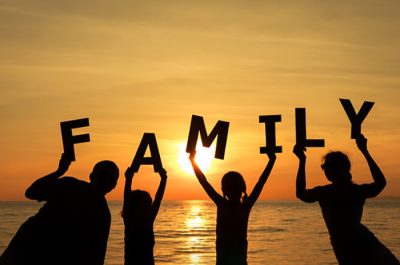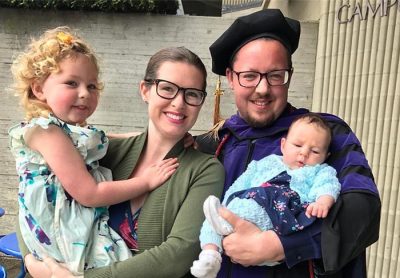FTM’s Family Support: The Importance of Family Friendships
FTM individuals are unique and amazing, while we possess unique and personalized experiences, our stories are often similar. These stories of struggle, resilience, and eventually respite, are relatable to almost every trans individual. One of the most common struggles we face, originates, sadly, from our own biological family.
One of the most common struggles faced by our community members is the reaction of our own families. It is unfortunate that once we decide to embrace our identities openly, our family dynamics change, more often than not, for worse. We have individuals who have had their family embrace their transition warmly.
Unfortunately, these stories cannot be categorized as a shared experience. Most of us are met with rejection and hostilities from one or more of our family members. This can lead to an unstable household and unsustainable relationships within the family.

However, most of us have found the support and comfort, that should have been provided by our family in the first place, in family friendships. These are individuals who have been close to FTM and are usually the confidants. These allies have helped a lot of us in getting our biological families to be educated and come to terms with our journeys.
Understanding FTM Family Dynamics
When it comes to coming out as a trans individual, a lot of the family members are taken by shock. this is influenced, for the most part the stigma attached to the trans identity and the mistreatment of the trans community. Along with some misconceptions and taboos regarding the topic. Coming out as an FTM is a nerve-racking affair. The prospect of being rejected by our primary caregivers is distressing.
Most of these tensions arise from the family members not fully understanding our experiences, and filling in the missing pieces of information from the aforementioned misconceptions. During these moments, tensions flare up, and volumes rise, resulting in unproductive conversations and frayed relationships.

However, over time and in instances of more open-minded and calmer family members, these conversations go a lot easier. A calmer environment leads to a clearer discourse and enables our families to understand us a lot better. These conversations do bear fruit, with our families figuring out ways to support us through this journey and in the long term.
The Role of Family Friendships
A lot of us have found that involving a family friend during these conversations is helpful. A family friend is an individual who despite having no biological or marital ties has friendly relations with the whole family.
These individuals are a great help for a transitioning individual, especially for an FTM. Family friends’ bond to individual members makes them a great source to see individual struggles, that the family members are hesitant to share. Because of this, they can be a great resource to confide in and discuss strategies to share your identity with your family.

It is important to have a strong relationship outside of the family. these platonic relationships help an FTM individual maintain their mental health. Having an outsider perspective that is close to the individual and the family can be excellent to mediate in case a major conflict erupts. they can also help maintain and repair the frayed or tense relationship between the FTM individual and their family if things go too far south.
Common Challenges Faced by FTM Individuals Within Families
One of the most common challenges, an FTM individual faces, is coming out to their own biological family. Irrespective of how progressive one’s family is, or how deep one has the connection to their family members, there is always this gut-churning moment every transitioning face, that is coming out the family. The what-if scenarios, the outbursts from their doting parent, etc.

All these concerns are valid because they are based on reality. we all have heard of the violent stories experienced by trans people especially when trying to communicate with their families. So, before having this conversation with family, it is often helpful to have this conversation with your family friend. They might be able to give you a second perspective, talk rehearsed, or by mutual understanding, offer to come out for you to some member of your family that you feel like you won’t be able to face.
In case one or more of the family members become resistant, unsupportive, or outright hostile, it is important to take a step back and remind yourself of your own self-worth. Take note of all the relationships you have and all of the amazing people that you have in your life. While your family members may have different opinions that are directly affecting you, there’s little you can do to change that if they are not willing to open their own minds. In case you fear violence, here is a list of helplines and resources

It is also worth noting that despite your family friend being there for you, they, at the end of the day, are still human. So be mindful of their boundaries while maintaining a balance for their offer for support and vice versa. So, try to find a middle ground and find other solutions with them.
Strategies for Building and Nurturing Family Friendships
After coming out, when you feel like there are some individuals with whom you have a tense relationship, the urge to confront them outright is very strong. These confrontations are more often than not counterproductive and end up damaging the relationship further. It is, however, not advised to avoid these conversations. But rather, have these conversations in a more festive environment.
These environments can be created by throwing low-budget/ crowd- sourced parties, like a backyard barbeque, or a day at the beach. Make sure to invite both your accepting circle and somewhat hesitant circle of friends and families.

It is scientifically proven that food acts as a mood stabilizer for a lot of people. During events like these, your strenuous relations will most likely engage with your support community and will feel more open to accepting your identity. Furthermore, these events would help you avoid the same conversation again and again with the resistant individuals in your life, as they might have these conversations with other individuals at these events.
Success Stories and Testimonials
“Having Uncle Hank as a friend and ally during my transition was the best I could have asked for. He was there for me throughout that dinner conversation with fam and him being there reminded me that all won’t be lost if things went bad.” ~ Al
“Loved my High School friends, Benny, Crista and Rob to help plan and execute my birthday/coming out party at the beach. Wish I could pay them back somehow” ~ Frank

“Coming out wasn’t an easy decision for me and I wasn’t planning on coming out to my family at all, however, my friend Sam convinced me otherwise and I’m glad I changed my mind. Despite the tumultuous few weeks and living away from them, my family eventually came around and accepted me for who I am” ~Seb
Resources for FTM Individuals and Families
Support Organizations and Networks for FTM individuals and their families can be found here.
Books, Articles, And Documentaries on Navigating Family Dynamics During Gender Transition
- TransGender Kinship: TransForming Family
- Article discussing the ways to support one’s transgender partner based on interviews by willing participants
- Transgender Parents and Their Adult Children’s Experiences of Disclosure and Transition
- Transgender Documentaries: Exploring Identity and Society

Professional Resources Such as Therapists and Counselors Specializing in Gender Issues

Common Concerns and FAQs
How to approach family members who may not understand or support the gender transition?
Plan ahead, if you have an LGBTQ+ (or potentially an ally) family member / cousin, ask for their help. Ask if they can share some of the emotional burden by answering some generic queer-related questions. you can also reach out to some of the helplines/ professionals provided below to run interference for you.

Tips for fostering open communication within extended family circles
It is important to foster and not self-isolate with your extended family solely on the basis of one’s transition as closed communication channels cause stigma and misconceptions to grow. the extended family can be occasionally invited to the aforementioned events occasionally so that. they can be involved in the conversations.

How to address concerns about children or younger family members
The tip to communicate to children is to keep the answer simple. some sample replies regarding their questions could be “Some people are hurt and confused by the way they were created, as a result they want to change so that they are happy”

Conclusion
Despite all the hardships that an FTM individual goes through, the individual must know that they are loved and they have a new support system growing around them even if the old one seems to be faltering. We embarked on this journey and we have got this!

 Basic Packers
Basic Packers Pack & Play
Pack & Play STP
STP